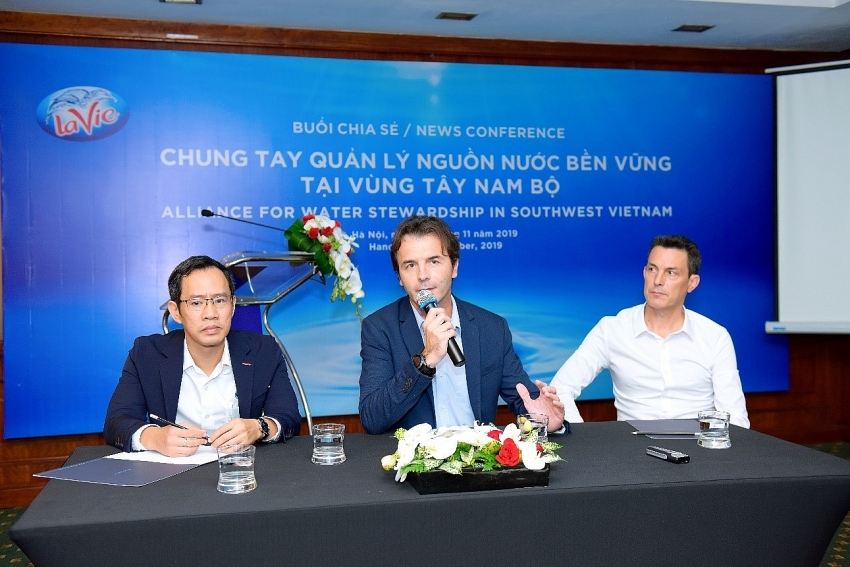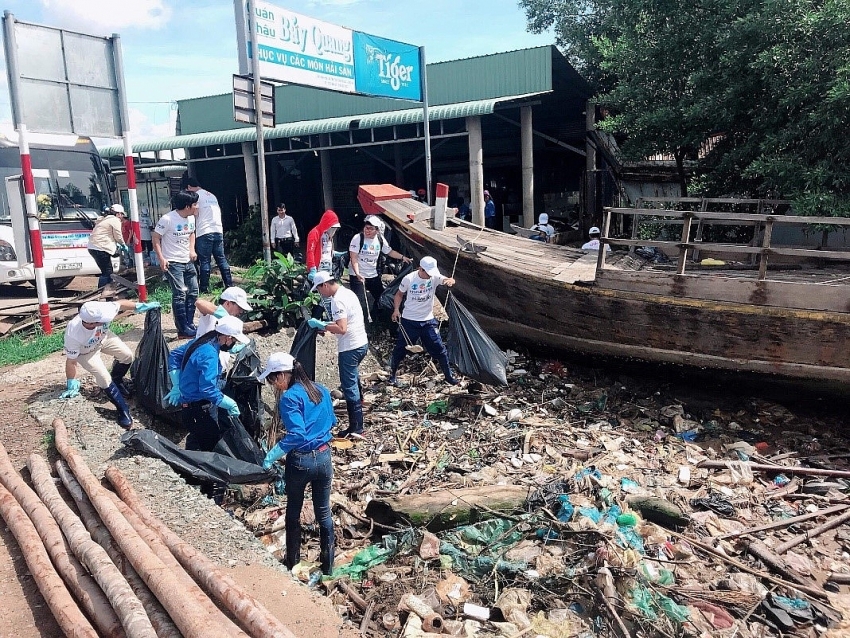Joining hands for sustainable water stewardship
Water stewardship: Alliance is paramount
A research published by the National Geographic stated that while water covers about 70 per cent of the earth, only 2.5 per cent of it remains fresh; only a third of it is easily accessible, with the rest blocked by glaciers and snowfields.
The United Nations has forecasted that the demand for freshwater among industries will double by 2020, while households will require 130 per cent more clean water; the UN also noted that 40 per cent of the world's population will live in areas that lack water as a direct result of climate change and groundwater depleting.
Vietnam is currently one of the fortunate countries facing a low risk of water crisis, though it is projected to be significantly affected by climate change. In addition, water resources in Vietnam are being shared by many parties.
| It is necessary to take on practical activities for sustainable water stewardship. Protecting water resources should not be carried out by a separate individual or a sole organisation -- it is a shared responsibility of all mankind. |
At the recently held seminar on water stewardship in southwest Vietnam, Sylvain Anus – an expert from French-based engineering and environmental consulting firm Antea Group – shared its findings of a study conducted late 2016, outlining that short- and medium-term forecasts see a positive groundwater balance in the Vam Co basin.
In Long An province, the water volume has been recharged yearly, by even four-folds the amount of abstracted water. However, some 95 per cent of water is shared by different stakeholders, such as industrial zones, water treatment plants, households and schools.
Therefore, it is necessary to take on practical activities for sustainable water stewardship. Protecting water resources should not be carried out by a separate individual or a sole organisation -- it is a shared responsibility of all mankind.
“The Alliance for Water Stewardship (AWS), under the management of and coordination among the government, businesses, and local communities, will help sustainably manage water resources,” said Marc Alary, Water & Environmental Sustainability manager – Asia, Nestlé Waters.
 |
| All guest speakers at the seminar stressed that alliance for water stewardship is needed |
Business commitment
To support sustainable water management around the world as well as in Vietnam, Nestlé Waters is applying water stewardship principles and committed to certifying all of its factories with the robust Alliance for Water Stewardship standard by 2025, including La Vie, a member of Nestlé Waters. In May 2019, the La Vie Long An factory became the first in the country to receive an AWS Standard certification.
The main targets that the AWS programme addresses include good water governance, sustainable water balance, good water quality, healthy status of important water-related areas, and safe water, sanitation and health for all. To this end, the cooperation of numerous stakeholders are required, including government, businesses, and local communities.
La Vie as well as any water plant applying the AWS Standard are required to understand and identify challenges, opportunities and risks, set up specific action plans to address or minimise those risks and challenges for the plant's watershed, as well as seek opportunities for sustainable water development. To be AWS certified, factories must meet 30 criteria and 98 indicators, with the strict evaluation process conducted by a third party.
This year, nearly 300 households in Long An have been supported to access clean water from municipal water supply. Some canals have been cleaned to provide irrigation water for farming, limit disease sources and reduce the risk of groundwater pollution.
Furthermore, nearly 1,500 students and staff of some colleges and universities have been instructed to use water sparingly. This is one of La Vie's efforts in supporting local authorities and communities to understand and implement the AWS global water management programme.
 |
| Several canals in Long An province have been cleaned and cleared |
At the La Vie Long An factory, there have been significant improvements in the efficient use of water, including cost-saving initiatives within the watershed, effective application of a wastewater treatment system and environmental protection, and cooperation with partners to practice water saving in use.
The factory has achieved a success in supporting the Long An authorities and community to work together for sustainable water management. La Vie also strives to contribute to improving people's access to clean, safe water and support the community to protect surface water, as well as shallow and deep groundwater in the area.
“In the next 10 to 20 years, Nestlé will certify all of its water plants with AWS standard, then the food plants,” said Alary. “We not only promote the implementation of the AWS Standard within Nestlé, but also want to expand to the food and beverage industry as well as many other sectors. This is the ultimate goal of Nestlé for a sustainability of water resources.”
| La Vie was last week honoured as one of top 100 most sustainable businesses in Vietnam by the Vietnam Business Council for Sustainable Development under the the Vietnam Chamber of Commerce and Industry (VCCI). It is a recognition for La Vie’s continuous efforts to support sustainable development. Along with the AWS water management programme, La Vie embarks on a journey for zero environmental impact of its packaging with the goal to achieve 100 per cent recyclable or reusable packaging by 2025. |
What the stars mean:
★ Poor ★ ★ Promising ★★★ Good ★★★★ Very good ★★★★★ Exceptional
Related Contents
Latest News
More News
- Bac Ai Pumped Storage Hydropower Plant to enter peak construction phase (January 27, 2026 | 08:00)
- ASEAN could scale up sustainable aviation fuel by 2050 (January 24, 2026 | 10:19)
- 64,000 hectares of sea allocated for offshore wind surveys (January 22, 2026 | 20:23)
- EVN secures financing for Quang Trach II LNG power plant (January 17, 2026 | 15:55)
- PC1 teams up with DENZAI on regional wind projects (January 16, 2026 | 21:18)
- Innovation and ESG practices drive green transition in the digital era (January 16, 2026 | 16:51)
- Bac Ai hydropower works stay on track despite holiday period (January 16, 2026 | 16:19)
- Fugro extends MoU with PTSC G&S to support offshore wind growth (January 14, 2026 | 15:59)
- Pacifico Energy starts commercial operations at Sunpro Wind Farm in Mekong Delta (January 12, 2026 | 14:01)
- Honda launches electric two-wheeler, expands charging infrastructure (January 12, 2026 | 14:00)

 Tag:
Tag:


























 Mobile Version
Mobile Version